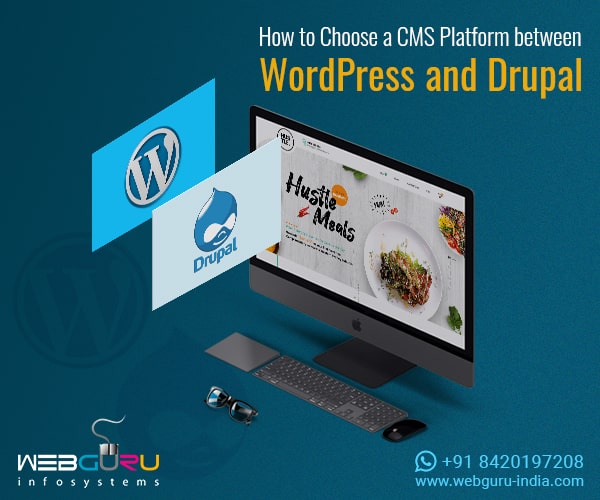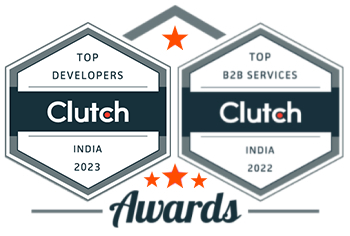Home Blog Website Development How to Choose a CMS Platform between WordPress and Drupal
How to Choose a CMS Platform between WordPress and Drupal
- 07 Aug / 2020
- 7,807 views

The popularity of CMS or Content Management System has increased over the years given the rapid pace of digital transformation taking place globally. A CMS allows even a non-programmer to build and more importantly, manage a professional-looking website without knowing much about coding. This ease-of-usage has made it a favourite, be it for an individual, organization, government agency, or any other entity, to create and manage the content of a website.
Interestingly, nearly half of all the websites in the world are built on CMS platforms (w3techs.com.) And among them, WordPress has the lion’s share of 63.6% as on March 1, 2020. Some notable websites built on WordPress include Whitehouse.gov, Mercedes Benz, TechCrunch, Sony Mobile, and the University of Washington, among others. Drupal, on the other hand, has a paltry market share of 2.6% as on March 1, 2020 (w3techs.com.) The notable websites build on Drupal include Nasa.gov, University of Colorado, Dallas Cowboys, and The Economist, among others.
So, given the wide variation in their market share, why should we compare them in the first place? Isn’t it obvious that WordPress takes the cake by a long margin? Well, irrespective of their popularity or market share, both platforms offer significant advantages – whether for a seasoned web programmer or someone new to the world of CMS solutions.
Advantages of WordPress and Drupal
The few pointers that make both the platforms popular are:
Open Source: Both the CMS solutions are open source, in other words, free to use and develop further. In a competitive digital world where cost plays a significant factor, the affordability and customization of both platforms are significant pluses.
Strong Community Support: Both WordPress and Drupal are backed by a strong community of developers who keeps the platforms up-to-date and resolves the queries of any user.
Ease of Usage: Compared to the other CMS solutions, especially the premium ones, both WordPress and Drupal are considered fairly easy-to-use.
Differences between WordPress and Drupal
When it comes to choosing between the two CMS platforms, there are some key differences. Let us know about them.
# Pricing: The cost of developing a website on WordPress or Drupal may vary depending on whether the job is done in-house or outsourced to a website development company. Further, the cost will depend on the requirements of the website including the level of customization or scalability.
For WordPress: The initial investment for the platform is free. However, there may be cost accruals depending on requirements such as domain registration, the addition of premium plugins and themes, and security features. Remember, more the customization, more will be the cost of development as you may need to integrate premium plugins or build customized ones. So, unless the website is very complex, WordPress can be very affordable and tend to be cheaper than Drupal.
For Drupal: Drupal development services demand higher technical expertise at the developers’ end. However, once the website framework and necessary functionalities are ready, there is less cost escalation when it comes to scaling the website or adding customizations. Interestingly, Drupal can be a cost-effective CMS platform in the long run if the need for developing the website keeps on changing or evolving.
# Learning Curve: WordPress can be learnt easily by any non-technical person compared to Drupal, which is quite complex. Being intuitive and user-friendly, WordPress can be used even by a non-programmer to build a website. Moreover, its large community of users can lend support and resolve queries during the development of a website. Drupal, on the other hand, is not easy for non-programmers to work on, especially its content creation process.
# Customization: Both platforms offer great resources for customizations and extensibility. However, there are differences in the way these are achieved on each platform. For example, WordPress offers 5000+ themes and 53,000 plugins for free compared to Drupal’s 2500+ themes and 39,000 modules (equivalent to WordPress’s plugins) for free. As the number of themes and customizations is more in WordPress (more can be added for a fee), the scope of customization is huge.
In Drupal, most of the functionalities to customize the website are built into the themes, which preclude the need to rely on third-party plugins. Besides, Drupal can be considered more flexible and efficient when it comes to organizing a large quantum of content and data. However, given the fact that Drupal is relatively complex for custom development, the need to employ professionals offering website development services is more.
# Security: In an ideal scenario, both WordPress and Drupal are highly secured CMS platforms. However, WordPress is more susceptible to hacking given the fact that it allows for the integration of more number of third-party plugins. And if proper security measures are not taken by the users during the addition of unverified third-party plugins, the chances of malware gaining entry are more. Drupal, on the other hand, is less reliant upon third-party modules or extensions as most functionalities for customization are inbuilt. So, one can say that Drupal is more secure as the users’ habit of adding unverified third-party plugins is less compared to WordPress.
# Custom content types and views: Drupal has more flexible custom content types while WordPress does not have any custom post types.
# Access control/user permission: While WordPress offers 5 basic user roles, Drupal comes with a built-in access control system to create new roles with individual user permissions.
# Support for multilingual sites: WordPress users have to turn to third-party plugins to get core support for multilingual sites while Drupal 8 has such support feature baked into its core.
# Taxonomies to handle voluminous data: Drupal’s system of taxonomy can handle lots of content due to its enhanced flexibility compared to WordPress.
Which CMS to choose – WordPress or Drupal?
It ultimately boils down to the objectives of pursuing CMS website development. The objectives may include the budget, functionalities to be added, need for scalability, customizations in future, and user experience, among others.
If someone is looking for an initial low-cost investment, then WordPress is the ideal CMS platform given its easy learning curve, availability of free themes and plugins, and the option for customization by adding third-party plugins. Besides, WordPress development services can be fairly quick unless some complex functionalities are added.
On the other hand, if someone is looking to develop a robust and complex CMS solution, which may need to be changed frequently in the long run, then it is better to opt for Drupal. This is due to the availability of several built-in functionalities for customization.
Conclusion
Apparently, both CMS platforms have their respective pluses and can be chosen based on specific business objectives and requirements. Should you be looking to develop a CMS based website and are unsure of choosing the right platform, contact experienced CMS web development services.
6 comments
Leave a Reply

-
1000+
Happy
Clients -
25+
Countries
Served -
19+
Years of
Trust









Nice Post.
Nothing can be understand should be written in brief
Hi, Thank You for this Information
I Think also WordPress IS the Best CMS because It’s SEO Friendly.
We provide website Designing Services and Development and we are also prefered WordPress CMS.
very deep and informative post. its a valuable content.
Thanks for sharing information..As we know, every business is based on online presence according to today’s market scenario. With the online revolution today it is only through a well designed & maintained website one can gain credibility.